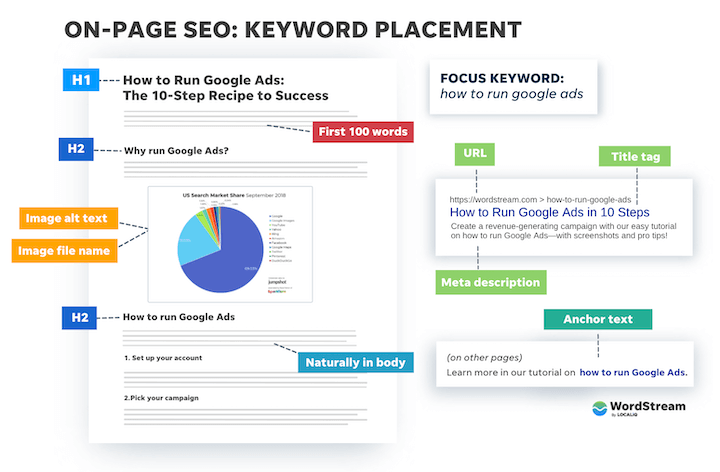Uncover the secret to dominating search engine rankings in 2024 with expert tips on selecting the best keywords for SEO.

Image courtesy of via DALL-E 3
Table of Contents
Introduction to Keywords and SEO
In today’s digital world, understanding SEO and keywords is essential for anyone looking to make their mark online. So, what exactly is SEO, and why do keywords play a vital role in it?
What is SEO?
SEO, short for Search Engine Optimization, is like a secret code that helps search engines like Google understand what your website is all about. When you use the right keywords, it’s like telling search engines, “Hey, show my website to people searching for this topic!”
Why Are Keywords Important?
Keywords are the key to unlocking the door to your website. They are the words or phrases that people type into search engines when looking for something. By using the right keywords on your website, you increase the chances of your site showing up in search results when someone searches for those words.
Understanding How Keywords Work
When you search for something on the internet, you type in specific words or phrases that describe what you’re looking for. These words are known as keywords. Search engines like Google use these keywords to find the most relevant websites that match your search. They look at the keywords on websites to decide which ones are the best match for what you’re looking for.
Types of Keywords
Keywords come in different types. There are short-tail keywords, which are brief and general, long-tail keywords that are longer and more specific, and LSI keywords, which are related terms that help search engines understand the context of your content. Choosing the right mix of these keywords can help your website appear in search results when people look for information related to your content.
Finding the Right Keywords
When it comes to choosing the best keywords for your website, there are helpful tools available that can make the process much easier. One such tool is the Google Keyword Planner. This tool allows you to see the search volume for specific keywords, as well as how competitive they are. By using this tool, you can identify which keywords will be most beneficial for your SEO strategy.

Image courtesy of www.ilfusion.com via Google Images
Brainstorming Keywords
If you’re looking to come up with keywords on your own, one effective strategy is to put yourself in the shoes of your target audience. Think about the words and phrases they would use when searching for information related to your website. By brainstorming and considering what your audience might type into a search engine, you can come up with relevant keywords that will help drive traffic to your site.
Analyzing Keyword Competition
When it comes to choosing the best keywords for SEO, it’s essential to understand how to evaluate the competition for those keywords. By analyzing keyword competition, you can determine which keywords will be most effective for your website and which ones may be more challenging to rank for.
Checking Keyword Difficulty
One way to analyze keyword competition is by checking the difficulty of ranking for a particular keyword. There are tools available that can provide you with a score or rating that indicates how easy or difficult it will be to rank for that keyword. The higher the difficulty score, the more competitive the keyword is, making it harder for your website to rank well for it.
Analyzing Competitor Websites
Another important aspect of analyzing keyword competition is looking at competitor websites. By studying what keywords your competitors are using and how they are incorporating them into their content, you can gain valuable insights into their SEO strategies. This can help you identify opportunities to differentiate your website and target keywords that may be less competitive but still relevant to your audience.
Using Keywords Effectively
When it comes to using keywords effectively for SEO, it’s crucial to strategically place them within your content. Search engines like Google look at where your keywords are located to determine the relevance of your website to a user’s search query. Make sure to include your chosen keywords in important places such as titles, headers, and meta descriptions. By placing keywords in these key areas, you increase the chances of your website showing up higher in search results.

Image courtesy of exposureninja.com via Google Images
Avoiding Keyword Stuffing
While it’s essential to include your keywords strategically, it’s equally important to avoid keyword stuffing. Keyword stuffing refers to the practice of overloading your content with too many keywords in an attempt to manipulate search engine rankings. This can result in your website being penalized by search engines for engaging in deceptive practices. Instead, focus on creating high-quality, valuable content that naturally incorporates your keywords. By maintaining a balance and avoiding keyword stuffing, you can improve your SEO without risking penalties.
Measuring Keyword Performance
In order to see how well your chosen keywords are performing on search engines, it’s essential to track their progress. By analyzing the data, you can understand which keywords are driving traffic to your website and which ones may need adjustments.
Using Google Analytics
Google Analytics is a powerful tool that helps website owners track various metrics, including keyword performance. By linking your website to Google Analytics, you can easily see which keywords are bringing in the most traffic.
Within Google Analytics, navigate to the Acquisition section and then click on Organic Search. Here, you’ll find a list of keywords that users have searched for before landing on your site. This data can give you valuable insights into which keywords are most effective in driving traffic.
Adjusting Keyword Strategy
Based on the data you gather from Google Analytics, you may need to make adjustments to your keyword strategy. If you notice that certain keywords are not performing well or are attracting the wrong audience, consider replacing them with more relevant ones.
It’s crucial to regularly monitor your keyword performance and make changes accordingly. By staying on top of how your keywords are doing, you can ensure that your SEO efforts are optimized for success.
Staying Updated with Keyword Trends
Keeping up with the latest trends in SEO can help you stay ahead of the competition. In 2024, there are several key trends to watch out for. One major trend is the increasing importance of user experience. Search engines like Google are placing more emphasis on websites that provide a great user experience, such as fast loading times and mobile-friendliness.

Image courtesy of www.wordstream.com via Google Images
Another trend to keep an eye on is the rise of voice search. With the growing popularity of devices like smart speakers and virtual assistants, more people are using voice search to find information online. This means that incorporating long-tail keywords and natural language into your content can help you rank higher in voice search results.
Additionally, visual search is becoming more prevalent. Users can now search for images using pictures rather than text. Optimizing your images with descriptive filenames and alt text can improve your visibility in visual search results.
Using Trend Tools
There are several tools available that can help you stay updated with the latest trends in SEO. Google Trends is a useful tool that shows you how search queries change over time. By monitoring trending topics and keywords, you can tailor your content to match popular search trends.
Another helpful tool is SEMrush, which provides insights into your competitors’ keyword strategies and allows you to track changes in search rankings. By analyzing your competitors’ performance, you can identify new keyword opportunities and enhance your own SEO strategy.
Conclusion
In this article, we have covered the essential aspects of choosing the best keywords for SEO in 2024. Understanding the significance of keywords and how they play a crucial role in helping websites rank higher in search engine results is key to a successful SEO strategy.
By grasping how search engines utilize keywords to match user queries with relevant content, you can tailor your keyword selection to attract the right audience to your website. Whether it’s short-tail, long-tail, or LSI keywords, knowing the various types can help you create a comprehensive keyword strategy.
Utilizing keyword research tools such as Google Keyword Planner and brainstorming keywords that resonate with your target audience are effective methods for discovering the most suitable keywords for your website.
Additionally, analyzing the competition for chosen keywords and carefully placing them in your content without engaging in keyword stuffing will contribute to your website’s visibility and ranking on search engine results pages.
Monitoring the performance of your keywords through tools like Google Analytics and adjusting your keyword strategy based on the data will ensure that your website remains relevant and competitive in the ever-evolving landscape of SEO.
Lastly, staying updated with keyword trends and incorporating new SEO trends in 2024 into your strategy will give you an edge over competitors and help you stay ahead in the digital realm.
By following these guidelines and continuously refining your keyword selection process, you can optimize your website for search engines and attract more organic traffic. Remember, choosing the best keywords for SEO is an ongoing process that requires dedication and adaptability to stay ahead of the curve.
Want to turn these SEO insights into real results? Seorocket is an all-in-one AI SEO solution that uses the power of AI to analyze your competition and craft high-ranking content.
Seorocket offers a suite of powerful tools, including a Keyword Researcher to find the most profitable keywords, an AI Writer to generate unique and Google-friendly content, and an Automatic Publisher to schedule and publish your content directly to your website. Plus, you’ll get real-time performance tracking so you can see exactly what’s working and make adjustments as needed.
Stop just reading about SEO – take action with Seorocket and skyrocket your search rankings today. Sign up for a free trial and see the difference Seorocket can make for your website!
Frequently Asked Questions (FAQs)
What are the Best Keywords for SEO?
When it comes to choosing keywords for SEO, the best ones are those that accurately reflect what your website or content is about and are frequently searched for by your target audience. These keywords should be relevant to your topic and have a decent search volume.
How Do I Know Which Keywords to Use?
To determine which keywords to use, you can conduct keyword research using tools like Google Keyword Planner. This will help you identify popular keywords related to your niche that you can incorporate into your content to attract more visitors.
Is Keyword Stuffing a Good SEO Strategy?
No, keyword stuffing is not a good SEO strategy. Keyword stuffing refers to the practice of overloading your content with keywords in an attempt to manipulate search engine rankings. This can result in a poor user experience and may even lead to your website being penalized by search engines.
How Can I Track the Performance of my Keywords?
You can track the performance of your keywords by using tools like Google Analytics. This tool allows you to see which keywords are driving traffic to your website and how well they are performing. Based on this data, you can adjust your keyword strategy accordingly.
Should I Keep Up with Keyword Trends in 2024?
Yes, it is important to stay updated with keyword trends in 2024. SEO is constantly evolving, and staying current with the latest trends can help you remain competitive in search engine rankings. Using trend tools can assist you in keeping abreast of the changing landscape of keyword usage.







